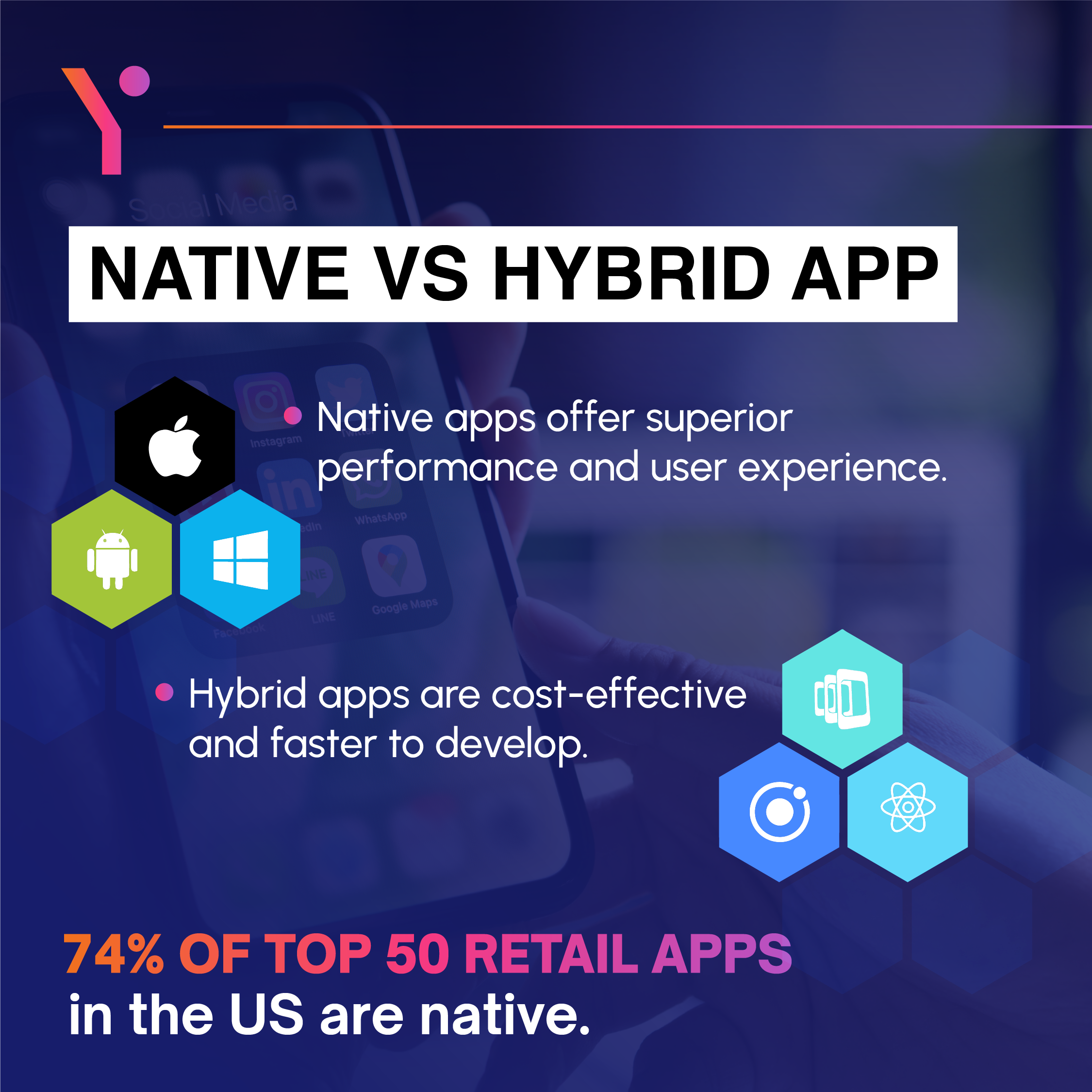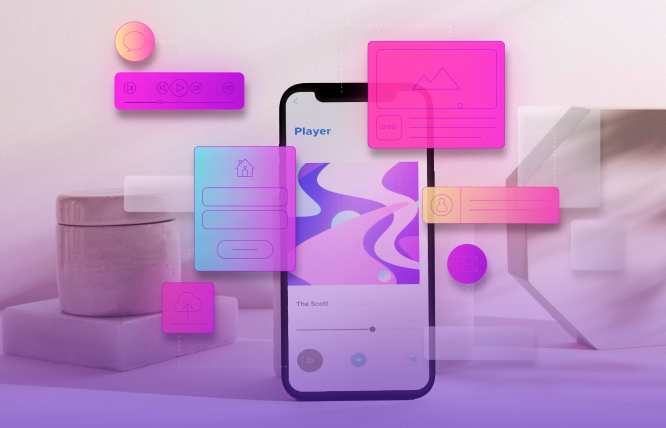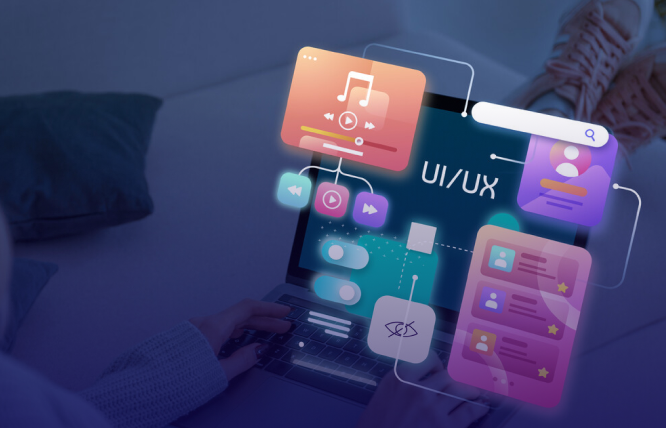Are you struggling to make a call between a native or hybrid app for your business? Read this blog as it takes a deep dive into key considerations regarding both. Here is a highlight of what is to come: Hybrid apps are budget-friendly but have limitations, whereas native apps present you with superior performance & full device access but come with a high cost.
Across the mobile-driven world, a robust mobile presence is a necessity rather than a luxury for businesses. Customers depend on tablets or smartphones for everything, such as entertainment, education, banking, or shopping.
Obviously, if businesses need to stay competitive, they must present a convenient and engaging mobile experience. This often brings the “native vs hybrid app” concern:
“Should a business invest in a native app created specifically for a single operating system (like Android or iOS), or go with a hybrid app that uses a single codebase to function throughout various platforms?”
This is why understanding the limitations and advantages of both approaches is directly related to making the right choice for a business. Businesses must also remember that there is no simple formula to determine the best choice for you, as you will find out.
Native vs Hybrid App: Two Development Approaches
| Feature | Native App | Hybrid App |
Performance | Superior responsiveness, speed, and performance | Possible performance limitations, may feel less responsive or slower |
Development Approach | Separate codebase for every platform (Android, iOS) | Single codebase for every platform |
Device Features | Complete access to device functionalities (GPS, camera, and others) | Limited access to specific features when compared with native apps |
User Experience | Intuitive, seamless experience tailored to specific operating system | User experience may not be as intuitive or smooth as native apps |
Development Cost | Usually higher because of separate codebases | Generally lower because of a single codebase |
Development Time | Longer development timelines when compared with hybrid apps | Quicker development time |
Maintenance | Needs ongoing maintenance for every platform (Android updates, iOS updates) | Little maintenance is needed when compared with native apps |
Need more feature-related information regarding the two development approaches? Consult FuturByte. We are a reputed app development company that will offer you the best possible advice.

Native Apps: Offering Performance Powerhouse
These are truly impressive points regarding native apps:
The Positives
- The native apps are supreme when it comes to responsiveness, speed, and performance. As they are created especially for a specific operating system (Android or iOS), they have the power to leverage the device’s hardware capabilities and native functionalities to their maximum potential. This will result in a smooth, seamless user experience that is intuitive and presents a natural feel for users who are used to that particular platform.
- Native apps have complete access to every device feature, like offline storage, microphone, GPS, and camera. This makes way for a highly interactive app experience and a wider range of functionalities. For instance, a fitness app created as a native app may seamlessly use the gadget’s GPS for real-time tracking during workouts, whereas a native food delivery app may use the camera for image recognition while seeking menu products.
Do you want to create the best possible food app for your company? Call FuturByte. We are a reputed AWS consulting company that enjoys a globally situated client base, and we would love to take a detailed note of your overall case.
Downsides
- Development of separate native app vs hybrid app versions for various platforms (Android and iOS) usually causes more development costs. This happens because every platform needs its own specialised development tools and programming language. Furthermore, ongoing maintenance becomes an issue since updates are required to tackle bugs or implement fresh features for every platform version.
- Development timelines are likely to be lengthier for native apps when compared with hybrid solutions.
Do you want advice on how to better deal with native app-related downsides? Consult FuturByte. We are a hybrid mobile app development company that has great expertise when it comes to managing native app-related downsides.
Hybrid Apps: Budget-Friendly, but Compromising?
Today, app development experts understand that hybrid apps present an alternative approach to cross-platform app development. Instead of different codebases for every platform, hybrid apps use a single codebase written in a language such as JavaScript, CSS, and HTML. Then, this code is wrapped in a native container that lets the app run on various mobile operating systems.
The Positives
- Hybrid apps present prominent cost benefits because of the single codebase approach. This allows them to be a highly attractive option for companies with limited finances or those wanting to quickly and cost-effectively develop a minimal viable product (MVP)
- Generally, the development time is quicker in hybrid apps. This allows companies to launch their app in a smaller time window and get beneficial user feedback.
- Usually, maintenance is less demanding than native apps since a single codebase requires updating for every platform.
Downsides
- Native vs hybrid app performance is where things may get complicated. True, hybrid apps may offer a visually appealing and functional user experience, but they are not likely to attain the same sort of responsiveness and speed when compared to native apps. This is because the app depends on web technologies that are required to be translated by the native container, possibly causing a small delay in response times or a not-so-smooth user experience when compared with a native app.
- Limitations of hybrid apps with regard to Native vs Hybrid app performance and access to device features are hard to ignore. Hybrid apps may not be able to completely utilise all the functions present on a particular device, possibly affecting an app’s capabilities. For instance, there can be issues in a hybrid fitness app with real-time GPS tracking because of limitations regarding how it interacts with a device’s hardware.
- A hybrid app’s user experience may not feel as intuitive and native as a native app, and this can negatively affect user engagement.
Need to know if opting for a hybrid app is the right choice for you? Consult FuturByte. We are a reputed custom Android app development company that will offer you sound advice on the matter.
Note this Before Deciding on Native vs Hybrid App
Your choice when choosing between a native app vs hybrid app depends on a thorough calculation of your unique priorities and needs. Take note of these important factors:
Long-Term Scalability and Growth
Project your app’s upcoming growth and possible need for further features or platform expansion. If you are expecting to expand to a host of platforms in the future, a hybrid app could present a budget-friendly option in the long run.
If you are prioritising a top-tier performance from the outset and a premium-level user experience, a native app could actually be the more appropriate choice, even if it means developing different versions for various platforms.
Do you want helpful advice in ensuring long-term scalability and growth? Contact FuturByte. We are a globally-recognised custom iOS app development service that can be of great assistance to you.
Development Resources and Budget
Take a good account of your available development resources and budget constraints. If budget is one of your leading concerns, then a hybrid app could be the right option because of its faster time to market and lower development costs.
If both budget and resources allow, then the user experience and superior performance of a native app could be the right investment.
Target Platform and Audience
Take note of your user base and the mobile operating systems the audience utilises. Let’s say that your target audience uses Android devices, then native Android apps for Android mobile device types could be the best way to reach them.
For iOS users, a native iOS app will offer the best user experience.
Do you want to better target your preferred audience? Call FuturByte. We are a React native mobile app development service that will offer you practical advice on the matter.
App Functionality
Evaluate your app’s core functions. If your app greatly depends on features such as complex device interactions (e.g. camera integration for augmented reality), offline functionality, or GPS tracking, a native app could be the right choice to ensure optimal access and performance.
Exploring Other Options Besides Native vs Hybrid
The native vs hybrid apps discussion may dominate the discussion. Still, it is essential to acknowledge the emergence of Progressive Web Apps (PWAs) as a possible alternative. PWAs present you with a hybrid approach, mixing the elements of both web apps and native apps. These are web applications that leverage service workers and other functions to offer an app-like experience, presenting features such as offline functionality and push notifications.
PWAs can be accessed via a web browser and installed on a user’s device, such as a native app, offering an accessible and convenient option for users disregarding the platform.
Additional Considerations
If you are a business that has a significant budget and highly specific needs, then partnering with an Android app development company could yield the best possible solution. This will ensure that you have full control over the app-related user experience and functionalities, amended specifically for the Android platform.
Regardless, you should still carefully evaluate the above-stated factors since this will help you make the right choice between hybrid and native app development. Ultimately, this will help you establish a robust mobile presence and effectively reach your target audience.
Concluding Remarks
After all of the points mentioned above, it is fair to state that your choice between a native app vs hybrid app relies on your business-related priorities and objectives. You should thoroughly evaluate your budget constraints, app functionality, target audience, and expected user experience prior to making a decision.
Always remember, there is not a single-size-fits-all solution, which means that the optimum solution will vary based on your particular situation. When you properly understand the strengths and weaknesses of both hybrid and native apps, you are in a better position to perform informed decision-making that lets you develop a mobile app which offers an engaging and successful experience for the users.
Finally, if you need information regarding any of the points discussed in this blog, then contact FuturByte. We are a globally recognised flutter mobile app development company that will offer you great informational aid.
Frequently Asked Questions
No, hybrid apps are very likely to show limitations in accessing all device features when compared to native apps.
AWS presents a host of services for app development, including mobile development tools, serverless computing, databases, and cloud storage.
Yes, native apps are commonly both faster and smoother since they are created specifically for a single operating system. Hybrid apps may showcase some performance limitations.
Yes, the hybrid app development process can be easier and faster since you are using a single codebase for a host of platforms. Native apps need a different code for each platform (Android, iOS)
Yes, the right prototyping tools will let you create basic versions or mock-ups of both hybrid and native app concepts. This will allow you to visualise the user experience and take note of possible limitations prior to investing in the full development process.
It is true that advancements are being made. Still, the likelihood is that hybrid apps will not match the sheer performance of a native app. For a host of basic app functionalities, a hybrid app’s performance may be sufficient.
Have questions or feedback?
Get in touch with us and we‘l get back to you and help as soon as we can!




